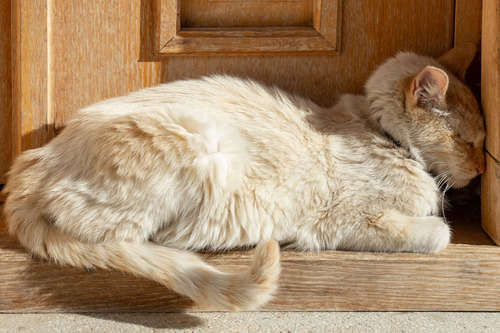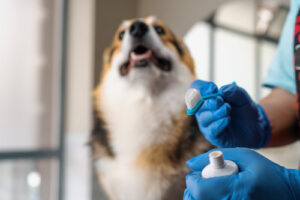Cat head pressing is a behavior that may seem strange or even amusing at first, but it can signal a serious underlying health issue. If you’ve noticed your cat pressing its head against walls, furniture, or other hard surfaces, it’s essential to understand that this behavior is not normal. In this blog, we’ll explore the causes, symptoms, and necessary actions to take if your cat exhibits head pressing. By the end, you’ll be equipped with the knowledge to help your feline friend and understand why prompt veterinary attention is crucial. If you notice any signs of cat head pressing, contact Sunset Animal Hospital in Houston, TX, at (713) 526-5881 or request an appointment online.
What Is Cat Head Pressing?
Cat head pressing involves a cat repeatedly pressing its head against a wall, floor, or another solid object without any obvious reason. This behavior is not a sign of affection or comfort. Instead, it often indicates a neurological problem or severe health issue that requires immediate veterinary attention. Head pressing can occur in cats of any age or breed, and recognizing this behavior early can make a significant difference in the outcome of treatment.
Symptoms Accompanying Cat Head Pressing
While head pressing itself is a clear warning sign, it is often accompanied by other symptoms that can help pinpoint the underlying issue. These symptoms may include:
- Circling or Pacing: Cats may walk in circles or pace aimlessly.
- Disorientation: Your cat may appear confused or unresponsive to familiar stimuli.
- Visual Impairment: Trouble seeing or bumping into objects could indicate vision problems.
- Seizures: Any form of seizure activity, from mild twitching to full convulsions, is a cause for concern.
- Behavioral Changes: Sudden changes in behavior, such as increased aggression or lethargy, can be significant indicators.
- Compulsive Licking: Excessive grooming or licking can sometimes accompany head pressing.
Recognizing these symptoms alongside head pressing can help your veterinarian diagnose the issue more accurately and promptly.
Causes of Cat Head Pressing
Several medical conditions can lead to cat head pressing. Understanding these causes can help in appreciating the urgency of seeking veterinary care.
Neurological Disorders
Head pressing is often linked to neurological issues. These can include:
- Brain Tumors: Growths within the brain can cause pressure, leading to abnormal behaviors like head pressing.
- Encephalitis: Inflammation of the brain due to infections, autoimmune diseases, or toxins can result in head pressing.
- Head Trauma: Previous injuries to the head can cause lasting damage, manifesting in behaviors such as head pressing.
Metabolic Disorders
Metabolic issues affecting the brain’s function can also cause head pressing. These disorders include:
- Hepatic Encephalopathy: Liver disease can lead to a buildup of toxins in the bloodstream, affecting brain function.
- Electrolyte Imbalances: Abnormal levels of sodium, potassium, or other electrolytes can disrupt neurological function.
- Hypoglycemia: Low blood sugar levels can cause neurological symptoms, including head pressing.
Infectious Diseases
Certain infections can impact the brain, leading to head pressing. Common infectious causes include:
- Feline Infectious Peritonitis (FIP): This viral disease can affect the nervous system, resulting in head pressing.
- Toxoplasmosis: This parasitic infection can cause severe neurological symptoms in cats.
- Rabies: Though rare, rabies is a fatal disease that can cause neurological symptoms like head pressing.
Toxic Exposure
Exposure to certain toxins can lead to neurological issues and head pressing. Common toxins include:
- Lead Poisoning: Ingestion of lead-based products can result in severe neurological symptoms.
- Pesticides: Certain chemicals used in pest control can be toxic to cats.
- Medications: Some medications, if overdosed or misused, can lead to neurological symptoms.
Diagnosis and Treatment of Cat Head Pressing
If you observe your cat head pressing, immediate veterinary attention is necessary. The diagnostic process typically involves several steps to identify the underlying cause.
Diagnostic Tests
Your veterinarian may recommend various tests to determine the cause of head pressing. These tests can include:
- Blood Tests: To check for metabolic imbalances, infections, or toxins.
- Imaging: MRI or CT scans to visualize the brain and detect tumors or other abnormalities.
- Electroencephalogram (EEG): To measure electrical activity in the brain and detect abnormalities.
Treatment Options
Once the underlying cause is identified, treatment can begin. Treatment options will vary depending on the diagnosis and may include:
- Medication: To manage infections, inflammation, or metabolic imbalances.
- Surgery: In cases of brain tumors or severe trauma, surgical intervention may be necessary.
- Supportive Care: Intravenous fluids, nutritional support, and other supportive measures to stabilize your cat’s condition.
Prevention and Early Detection
While not all cases of cat head pressing can be prevented, early detection and prompt veterinary care can significantly improve outcomes. Here are some tips for prevention and early detection:
Regular Veterinary Checkups
Routine veterinary visits can help detect health issues before they become severe. Regular checkups allow your veterinarian to monitor your cat’s overall health and catch early signs of potential problems.
Monitoring Behavior
Keep a close eye on your cat’s behavior. Any sudden changes, such as head pressing, should be reported to your veterinarian immediately. Early intervention can make a significant difference in the prognosis.
Safe Environment
Ensure your home is free from potential toxins and hazards. Keep medications, pesticides, and other chemicals out of your cat’s reach. Providing a safe environment can reduce the risk of toxic exposure and head injuries.
Cat Head Pressing: Taking Immediate Action
Cat head pressing is not a behavior to be taken lightly. It indicates a serious underlying health issue that requires prompt veterinary attention. By understanding the causes, symptoms, and necessary actions, you can ensure your cat receives the best possible care. If you notice any signs of head pressing in your cat, call Sunset Animal Hospital in Houston, TX, at (713) 526-5881 or request an appointment online. Your prompt action could make all the difference in your cat’s health and well-being.





